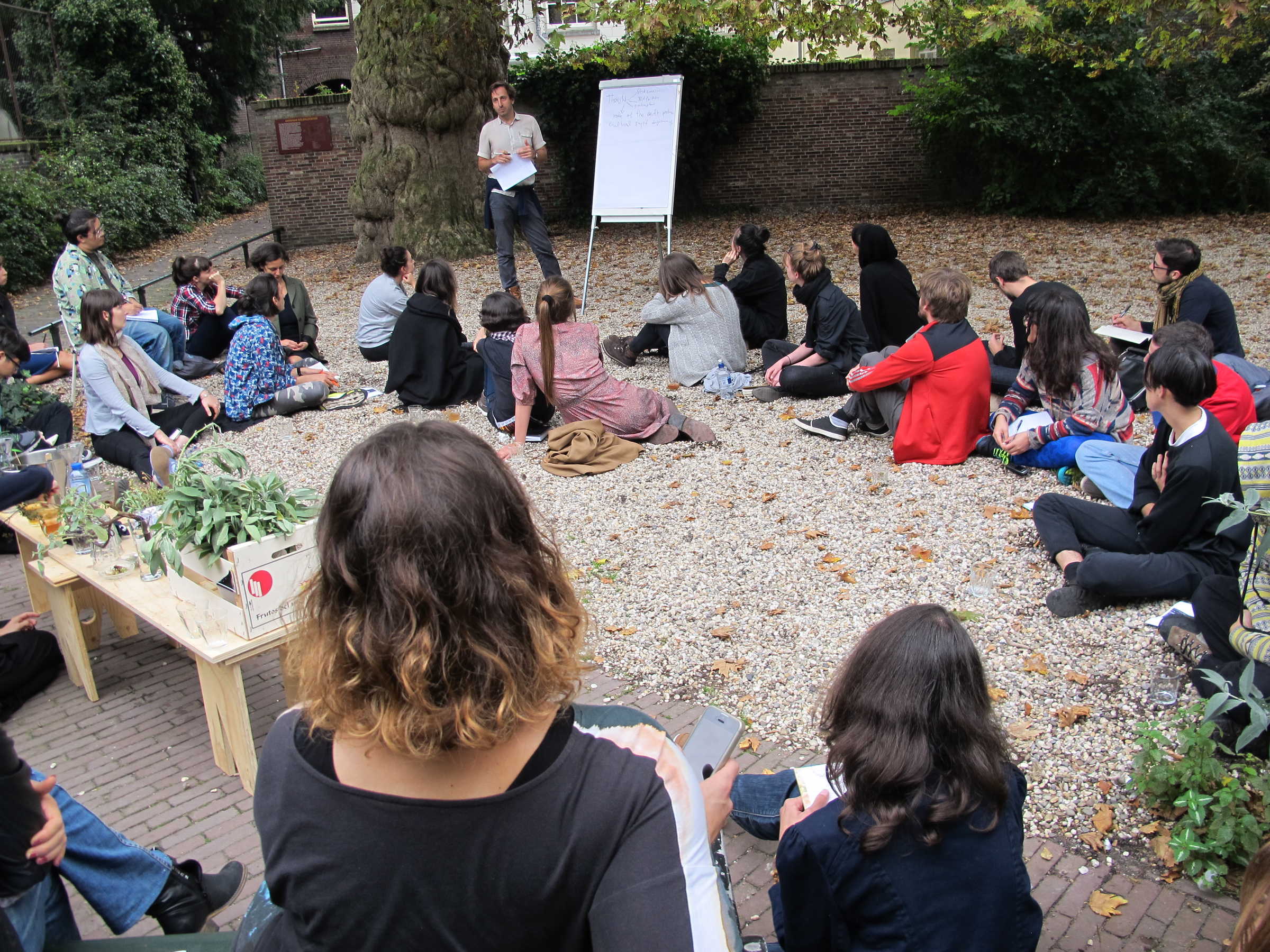2014 - 2015 SYLLABUS
Image: Fernando Garcia-Dory introducing the project "Publishing Class V: INLAND" (photo credit: Casco)
Please find the descriptions to the curriculum components below. First and second year students will co-participate all projects and classes. The logistical ordering during the DAI-weeks can be found here.
COOP Academy:
Each year, DAI presents the COOP Academy to its students: 3 commissioned projects tailored around specific research questions, organised and tutored by partnering organisations in the professional field. All students are expected to participate in ONE out of these 3 projects. Participation in a project includes attendance in the project during DAI weeks, self-tuition/home work outside DAI-weeks, occasional participation in events that take place outside the DAI weeks. COOP Academy aims to bring together a variety of practitioners in curated projects around shared questions and concerns that deal with notions of 'publicness'. Participants develop skills for artistic research, production and collaboration. The requested outcome will be defined by the project leaders and may consist of a group work and/or individual works.
ECTS 13( first year) + 13 (second year)
Read more about the specific content of the 3 COOP Academy projects on offer in 2014-2015:
~ Publishing Class V: Secret Garden Society
~ Affective Images: How Public Images Produce Affect in a Digital Age
~ Practicing with institutions, instituting practice
Roaming Academy:
The 3 Roaming Academy Projects entail both individual as well as collaborative research and production around specific curated trajectories offered by invited curators and their guests. Participation in each of the projects requires full presence during DAI weeks, self-tuition/ homework outside DAI-weeks, occasional participation in events that take place outside the DAI weeks as well as participation in workshops, seminars or exhibitions on location during a research trip. Students do not only engage with the production of works, but also with curatorial concepts and methods as well as with production and communication strategies.
ECTS 13( first year) + 13 (second year)
Read more about the specific content of the 3 Roaming Academy projects on offer in 2014-2015:
~ A Cinétract by other means: Notes from Tehran
~ To Make a Work: Molecular Revolutions
~ ACTION UNITES, WORDS DIVIDE (ON PRAXIS, AN UNSTATED THEORY)
How To Do Things With Theory
Writing a thesis is the final stage of the two-year course How To Do Things With Theory. Supported by individual tutoring, the student is expected to bring forward an artistic theoretical question arising from, and therefore closely related to her/ his artistic practice. During the first year, this includes a crash course academic writing, the student prepares by further deepening his/her theoretical research, always in some relation to his/her artistic practice. At the end of the first year, the student should have laid the foundations for the writing of the thesis in the second year. The thesis must be supported by a concentrated reading of at least six titles. The thesis should have a minimum of 10.000 words. The thesis must be presented in English and will be evaluated by a tutor who is part of the How To Do Things With Theory - team, supported by a review written by an invited independent reviewer (selected by the tutor and approved by the head of program).
ECTS 14 ( first year) + 13 (second year)
Read more about this module in 2014-2015
The Kitchen / Not The Restaurant
Every DAI week, the DAI organizes one full day of lecture-presentations by 6 -7 students, according to a schedule. Thus, in the course of the year, each student will present research in the form of a lecture or lecture-performance of 20 minutes (min /max) to an audience consisting of one, mostly two invited independent respondents ( writers, artists, curators) and their fellow students. Each student is invited to start her/his presentation with one key question for the guest(s). Following each presentation, in a conversational mode, the guests will try to engage with the question, live, on the spot, in the form of a spoken reflection. The sessions will be (lightly) moderated by the DAI's director Gabriëlle Schleijpen.
During the DAI week in July, final lecture presentations or performances by all students, in the presence of all core tutors/ project leaders will be organized. This will function as the final wrap up of the overall individual learning trajectory of the student ( next to group presentations / performances / exhibitions/ publications in the context of the curated DAI-projects)
ECTS 10 (first year) + 10 (second year)
Read more about this module in 2014-2015
Outside Academy / Free Space
Extra curricular activities initiated by DAI, students or third parties. We occasionally offer our students (and alumni) the chance to participate in projects organized by (or together with) third parties outside of the curriculum structure. Students who wish to participate can be asked to send in a written motivation, after which a selection of participants is made by the DAI-staff and/or the organizing institutes. The DAI can furthermore credit a student with a maximum of 5 points annually for other activities outside the DAI curriculum. These points are based on the professional effort needed for these activities. Points can only be accredited when a) the DAI receives sufficient and verifiable information regarding the students involvement in an activity - b) the activity is judged to be relevant for the students professional practice and/or development by director & staff.
ECTS: 5

